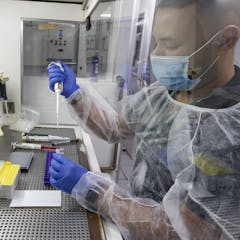
Articles on Patents
Displaying 1 - 20 of 112 articles

For the past half century, successive US governments have championed free trade. But do they practice what they preach?

The newly signed global Treaty on Intellectual Property, Genetic Resources and Traditional Knowledge might improve the patent system, but is unlikely to improve protection of Indigenous knowledge itself.

Most people don’t know what these labels really mean − and advertisers take advantage of that fact.

Theranos was dissolved years ago, and its CEO, Elizabeth Holmes, is in prison, but the company’s patents based on bad science live on – a stark example of the persistence of faulty information.

From diseases to climate change, we need new solutions more than ever – yet patents may be slowing us down. For example, there is growing evidence new drug development speeds up once patents expire.

The shortages, which have been going on for years, have typically affected only low-cost generics rather than profitable brand-name drugs.

Corporations restrict what farmers can do with their own seeds, as well as their farm equipment when it breaks down.

The incentives to bring manufacturing back to the US will affect productivity, but in ways that might be surprising.

In open-source endowed research positions, professors release all of their intellectual property. Surveys of academics in the U.S. and Canada find most like the idea.

The Medicines Patent Pool was created to promote public health, facilitating generic licensing for patented drugs that treat diseases predominantly affecting low- and middle-income countries.

Although female inventorship has grown over the years, 15 years’ worth of patent outcomes from IP Australia suggests inventing is still a luxury for women.

Waiving patent rights on COVID-19 vaccines and drugs is still crucial to ensure access globally, but the waiver on the table at the June World Trade Organization meeting doesn’t do the job.

The Coalition planned to tax company income from patents at 17% instead of 30%. While it would have lifted the number of patents, there’s little to suggest it would have lifted productivity.

Boosters and vaccinating children mean we’re relying on two pharmaceutical companies to supply Australia’s COVID vaccines. That needs to change.

Drug repurposing can redeem failed treatments and squeeze out new uses from others. But many pharmaceutical companies are hesitant to retool existing drugs without a high return on investment.

The Russian government has essentially legalised intellectual piracy as a response to sanctions.

Just as access to vaccines was vastly more difficult for low-income countries, the same is now true for the virus’ treatments: at potentially great cost to the world.

CORBEVAX is anticipated to significantly expand vaccine access to people in low- and middle-income countries.

Moderna claims its scientists alone invented the mRNA sequence used to produce its COVID-19 vaccine. The US government, which helped fund the drug, disagrees.

New Zealanders won’t see the full text of the UK free trade agreement until it is signed, meaning it will proceed without open public debate – despite locking in constraints on future governments.
